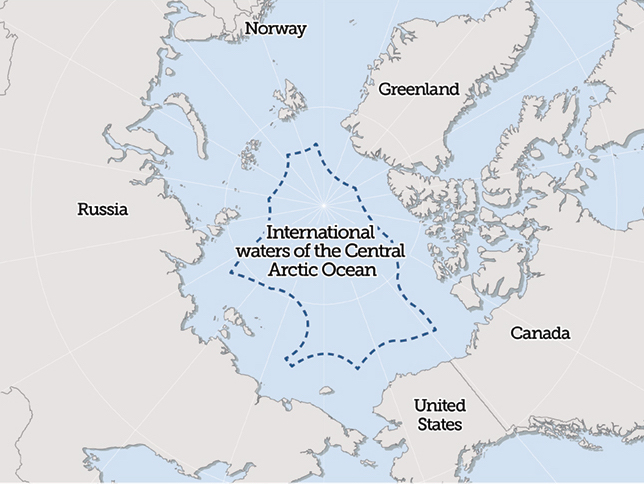Negotiators reach deal to ban commercial fishing in international Arctic waters
There will be no commercial fishing in international waters of the Arctic Ocean for at least 16 years under a landmark 10-government agreement reached on Thursday in Washington, D.C.
The agreement will close off the 1.1 million-square-mile international zone in the center of the ocean — an area known as the “Arctic donut hole.”

There has been no commercial fishing there yet, but retreating sea ice makes the area vulnerable to exploitation. In the past, the entire area was covered by ice year-round: but now much of that ice disappears in summer, leaving open water.
The agreement to prevent unregulated commercial harvests before they start — a precautionary approach that recognizes the rapid climate change happening in the Arctic — is historic, said members of the United States team working on the agreement.
“It’s the first time on the high-seas part of the ocean where we’ve decided to send scientists in before we send fishermen in,” said Scott Highleyman, vice president of conservation policy and programs at Ocean Conservancy and member of the U.S. delegation negotiating the agreement.
Dominic LeBlanc, Canada’s Minister of Fisheries, Oceans and the Canadian Coast Guard, also emphasized the agreement’s preemptive nature, saying in a statement that, “It’s the first time an international agreement of this magnitude has been reached before any commercial fishing takes place on a region of the high seas.”
The agreement also creates “the largest no-fishing area in the world right now,” Highleyman said.
David Benton of the U.S. Arctic Research Commission, also part of the US team, characterized the agreement as far-sighted.
“This is unique in that, unlike about everywhere else in the world, this agreement prevents a problem before it becomes a problem,” Benton said.
Governments in the agreement are the five nations with territory that borders the Arctic donut hole — the U.S., Canada, Russia, Norway and Denmark/Greenland — plus Iceland, China, South Korea, Japan and the European Union. (Finland and Sweden, Arctic nations without territory in the Arctic Ocean, are represented in the agreement by the EU.)
They have committed to keeping their nations’ fishing fleets out of the donut hole until a management plan, based on extensive research, is in place. The agreement covers a 16-year term, after which it would be renewed every five years unless one of the signing governments objects or a harvest quota system is in place for the region, Highleyman said.
An important element of the agreement is a commitment to a multinational and long-term science program, Highleyman and Benton said. There has never been a large-scale fisheries assessment conducted in the central Arctic Ocean, so the new program will start filling in key knowledge gaps, Benton said.
The science work will also make use of Arctic indigenous knowledge, according to the agreement text, Highleyman said. “That was pretty heartening to see,” he said.
A signing ceremony is expected next summer, Benton said.
The Arctic donut hole area has changed dramatically in recent years. Though it used to be dependably frozen, now up to 40 percent of it is open water for part of the year, according to the Ocean Conservancy.
Exactly what fish and fish habitats exist there or how many fish are there is yet to be understood, but speculation is that the area holds a lot of Arctic cod, a keystone species in that part of the world, Benton said.
“We do know they are a key link to the Arctic marine ecosystem,” he said.
Beyond the 10 governments in this agreement, other nations will be subject to its terms, Benton said. Most of the world’s nations are parties to a 1995 United Nations agreement on fish stocks, and there are additional agreements between countries on illegal, unreported and unregulated fisheries. Those previous agreements create “a network of interlacing, international agreements” that allow for the new Arctic fishery agreement to be applied and enforced, he said.
The new agreement has been in the works since 2015, when the five original nations issued a declaration to keep their fishing fleets out of the Arctic donut hole. Later that year, the project expanded to the 10 governments, and several negotiating sessions were held, mostly in Washington — site of the final meeting — but also in Iceland, Nunavut and the Faroe Islands.
But roots of the agreement go back further in the past.
A 2008 U.S. Senate joint resolution championed by Sen. Lisa Murkowski and then-Sen. Ted Stevens (both Republicans of Alaska) called for the U.S. to start international discussions “and take necessary steps with other Arctic nations” to protect fish stocks moving between maritime borders. It also called for the U.S. to support efforts “to halt the expansion of commercial fishing activities in the high seas of the Arctic Ocean.”
In 2009, the North Pacific Fishery Management Council approved a management plan that effectively precluded commercial fishing in U.S. federal Arctic waters. The Canadian government followed with its own Arctic fishery moratorium.
Another precursor of the Arctic agreement dates back decades, to an agreement that halted what was considered to be environmentally damaging fishing in international waters of the Bering Sea.
The Bering Sea Donut Hole, an area of about 50,000 square miles that lies between the territorial waters of the U.S. and Russia, was the site of heavy exploitation in the 1979s and 1980s by fishing fleets from several countries.
A 1994 agreement between the U.S., Russia, Japan, Poland, Korea and China closed that area to fishing, but damage from overfishing in those international waters was long-lasting.
Officials of the Arctic nations and from nations with Arctic interests took the Bering Sea donut hole lessons to heart, said Benton, who was an Alaska state fishery manager and who represented the state in those Bering Sea negotiations.
“It was a big impetus to get this agreement done,” he said. “The Bering Sea donut hole was a big deal.”